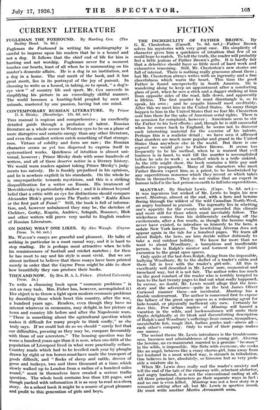MANTRAP. By Sinclair Lewis. (Cape. 7s. 6d. net.)— It was
ingenious but wicked of Mr. Lewis to begin his new novel, Mantrap, almost at the end, with a hero and heroine fleeing through the wildest of the wild Canadian North-West, an angry husband in pursuit. The ingenuity lies in whetting one's appetite for the events which preceded this climate and more still for those which must inevitably follow. The wickedness comes from his deliberately switching off the excitements, after a few words, as though the heroine might never have existed, to introduce us leisurely to the hero, a sedate New York lawyer. The bewitching Alverna does not appear again in the tale for a hundred pages. We learn a about Ralph, the hero, see him decide rather dubiously to take a real outdoor holiday. We know far more than we want to about Woodbury, a bumptious and insufferable person, who is Ralph's mentor and torment in their joint excursion to the great open spaces.
Only quite at the last does Ralph, flying from the impossible, bullying Woodbury, fly to the shelter of a trader's cabin and there fall in love with the trader's girl-wife. All this is excellently well described in Mr. Lewis' sure, economical and trenchant way, but it is not fair. The author relies too much on the good conduct of the reader who is terribly tempted to turn to the last twenty pages to find out what really happened. In excuse, no doubt, Mr. Lewis would allege that the love- story and the adventures—quite in the best James Oliver Curwood manner these—are incidental. Mantrap has a double undercurrent. The author is concerned first to expose the fallacy of the great open spaces as a redeeming agent for hide-bound, or physically inefficient city men. Certainly he does this. Few urban readers of Mantrap will hazard a vacation in the wilds, and backwoodsmen will smite their thighs delightedly at its bleak and discomforting description of Ralph's and Woodbury's sufferings from canoes, mosquitoes, uncatchable fish, rough diet, Indian guides and—above all— each other's company. Only to read of their pangs makes one uneasy. The second theme Mr. Lewis introduces is the troublesome- ness, baseness and admirableness of the young girl. Alverna the heroine, an ex-manicurist married to a genuine " he-man " in the wilds, is impossible. She flirts with everyone, she cooks like an angel, behaves like a crazy chorus-girl, runs away from her husband in a most wicked way, is staunch in tribulation. One believes in her, absolutely, so tiresome but so very prob- able a mixture she is.
When Mr.. Lewis does really end the reader's anxiety and
tell the end of the tale of the runaway wife, reluctant abductor, and angry husband, it is not the conventional ending at all.
All three principal characters go their separate ways in fact : and no one is even killed. Mantrap was not a love story in a romantic setting after all, but Mr. Lewis in sportive mood. He must write another Martin Arrowsmith soon.










































 Previous page
Previous page